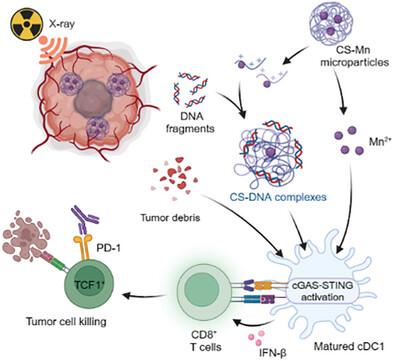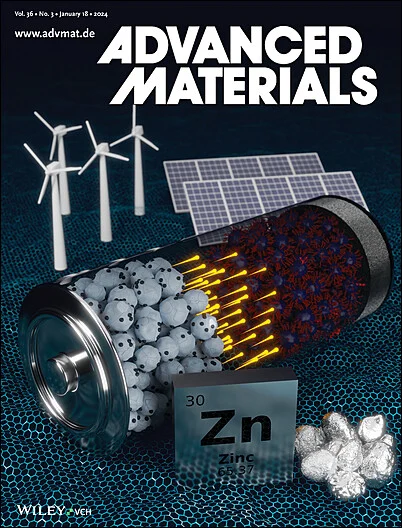DNA-Capturing Manganese-Coordinated Chitosan Microparticles Potentiate Radiotherapy via Activating the cGAS-STING Pathway and Maintaining Tumor-Infiltrating CD8+ T-Cell Stemness
IF 27.4
1区 材料科学
Q1 CHEMISTRY, MULTIDISCIPLINARY
引用次数: 0
Abstract
The radiotherapy-induced release of DNA fragments can stimulate the cyclic guanosine monophosphate-adenosine monophosphate synthase-stimulator of interferon genes (cGAS-STING) pathway to prime antitumor immunity, but this pathway is expected to be less potent because of the inefficient cytosolic delivery of negatively charged DNA fragments. In this study, manganese-coordinated chitosan (CS-Mn) microparticles with selective DNA-capturing capacity are concisely prepared via a coordination-directed one-pot synthesis process to potentiate the immunogenicity of radiotherapy. The obtained CS-Mn microparticles that undergo rapid disassembly under physiological conditions can selectively bind with DNA to form positively charged DNA-CS assemblies because of the strong electrostatic interaction between linear chitosan and DNA molecules. They thus enable efficient cytosolic delivery of DNA in the presence of serum to cooperate with Mn2+ to activate the cGAS-STING pathway in dendritic cells. Upon intratumoral injection, the CS-Mn microparticles markedly enhance the efficacy of radiotherapy against both irradiated and distal tumors in different tumor models via collectively promoting tumor-infiltrating CD8+ T-cell stemness and the activation of innate immunity. The radiosensitization effect of CS-Mn microparticles can be further augmented by concurrently applying anti-programmed cell death protein 1 (anti-PD-1) immunotherapy. This work highlights an ingenious strategy to prepare Trojan horse-like DNA-capturing microparticles as cGAS-STING-activating radiosensitizers for effective radioimmunotherapy.

DNA捕获锰配位壳聚糖微粒通过激活cGAS-STING通路和维持肿瘤浸润CD8+T细胞干性增强放疗效果
本文章由计算机程序翻译,如有差异,请以英文原文为准。
求助全文
约1分钟内获得全文
求助全文
来源期刊

Advanced Materials
工程技术-材料科学:综合
CiteScore
43.00
自引率
4.10%
发文量
2182
审稿时长
2 months
期刊介绍:
Advanced Materials, one of the world's most prestigious journals and the foundation of the Advanced portfolio, is the home of choice for best-in-class materials science for more than 30 years. Following this fast-growing and interdisciplinary field, we are considering and publishing the most important discoveries on any and all materials from materials scientists, chemists, physicists, engineers as well as health and life scientists and bringing you the latest results and trends in modern materials-related research every week.
 求助内容:
求助内容: 应助结果提醒方式:
应助结果提醒方式:


